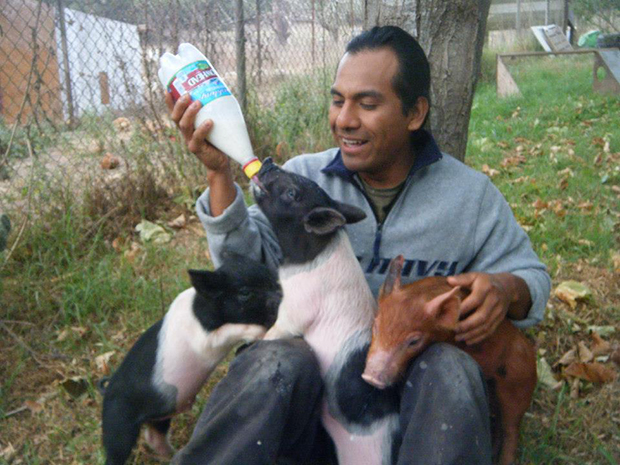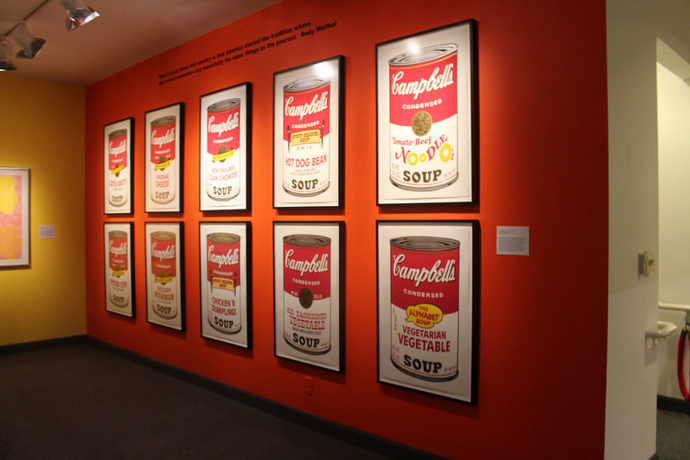
Angel feeds piglets from a bottle on his farm. (Photo courtesy of Angel*)
*The subjects of this story asked that their names be changed because of immigration status.
“When you are close to your family as a kid, you don’t think much about being apart from them, you just enjoy life the way it is. You might daydream about other parts of the world and what life is like there, but you are so attached to your home that you never imagine you’d ever leave.”
But when he was 15, Angel* knew it was time to leave.
***
Growing up in the small village of Oaxaca, Mexico, Angel was the ninth of 10 children. The son of farmers, he grew up with his family growing corn and coffee. His father was also able to work for an agricultural company as an instructor and translator as he was able to speak both Spanish and Mixteco, the local dialect.
The family was close, but by the age of 13 Angel knew that he would need to become more independent – that he would one day have to leave his family behind.
His small village in Oaxaca was too small to have its own high school so he moved to the city at 15 to continue his education. Away from his family, Angel rented an apartment with a classmate and worked to pay the rent, his mother sending him tortilla chips from back home. While the work was enough for the rent, Angel was unable to afford the books for class.
“I didn’t make enough to also afford books, and the school library was only open during my work hours, so I couldn’t even borrow the books I needed,” Angel wrote in an email. “I always wanted to be a history teacher, and realized I wasn’t going to be able to complete even a high school education this way.”
Angel heard how much farm workers in the U.S. were making, enough to not only cover the cost of his entire education but to support himself through school. The prospect of earning money for school was enough to make Angel take the trek North, intending to return home after making enough money for school.
The trip took five days of walking through the desert and by the last day they were out of food and water.
“Some people drank their own urine, and our throats got too dry to produce saliva. It was scary to be in the middle of nowhere and know my body was starting to shut down.”
When Angel finally crossed the desert into Arizona, he then headed to California where he got work on a pepper farm. He began work without documents, hence the need to change his name. The farming was unlike any farming he had done in Oaxaca. The work was fast and relentless, with people having to work through pain and thirst.
“Everyone worked as fast as they could, focusing on working fast and not able to look out for others,” Angel said. “You had to work like an animal, or a robot, to make it.”
What had started as an opportunity to earn money for school soon turned into a career. The pepper farm paid Angel minimum wage, then $5.75 an hour. But while the pay was better than what he could earn in Oaxaca, he said the work was “painstaking.” Having to work and pick as fast as possible while still being gentle with the vegetables was draining. Eventually tiring of conventional pepper farming, Angel instead found a job on a small organic farm. The work was much more diverse, the pay higher and the working conditions better.
While work on the organic farm was better, Angel’s dream to be a history teacher had turned into a dream to own his own farm. This dream came one step closer to becoming possible when he met Caitlin.
A mutual friend introduced Caitlin and Angel in 2008. Caitlin* had completed both her Bachelor’s and Master’s degrees and had started raising chickens after being fed up with the commercial meat industry. She found others who were interested in buying her chickens and knew that the product was in demand.
“I met Angel who knew the ‘production’ side of farming, how to produce food efficiently and on a regular schedule, and also a thing or two about how to direct-market farm products, which was important because we couldn’t sell the chickens in stores,” Caitlin wrote.
Though a U.S. citizen, Caitlin asked that her real name not be used because of her connection to Angel, still undocumented.
The prospect of starting a farm now seemed very real and Angel had a tough choice to make, leave the stability of his job or follow his dream.
“When I left the organic farm to start my own farm with Sarah, I had been making just over $12 an hour,” Angel wrote. “That was relatively decent pay, but I wasn’t going to get paid much more than that, and so it was worth the risk to start my own business.”
Starting the farm was about much more than increasing his pay, it was about creating something that he would be able to leave behind.
Caitlin and Angel started the farm in 2008 and they began dating in 2009. Caitlin described how they had both “sworn off dating” when they met but eventually began dating after Angel took her on a hike for her birthday. They were married in 2010 in an outdoor wedding, overlooking strawberry fields and the ocean.
“My favorite thing was discovering everything that is different about someone from a different culture, and getting to see my own culture through someone else’s eyes. Now that we know each other better, I like that (Caitlin) can be very responsible and serious when she needs to be, but also keep a good sense of humor, enough to handle a Mexican,” he wrote with a smiley face wink.
The ceremony took place in front of 100 guests and was conducted in English and Spanish. For dinner they served chicken that they had raised on their farm, some prepared in an Oaxacan mole.
Amid the excitement of their marriage, challenges awaited both on the farm and on getting Angel citizenship.
“We have probably made our immigration process harder by starting the farm,” Angel wrote. “Our finances don’t conform to what immigration officials are looking for, since a lot of my ‘income’ in the start-up phase is equity or assets rather than a regular paycheck.”
Through the process of gaining citizenship, Angel still must maintain work on the farm.

The chicken farm has now grown to include pigs, a cow and even turkeys during Thanksgiving. Angel’s day starts early in the morning with a cup of coffee and then he starts chores around the farm for a few hours before he comes in for breakfast. There are egg trailers that must be cleaned and sick animals cared for. There are building projects and a farmer’s market stall to run. Pigs need to be brought to the slaughterhouse and fencing needs to be rotated. Angel’s days can sometimes last up to 16 hours.
“Everything I do is important to making the farm work, even though many people wouldn’t want to do these tasks because they are too ‘small,’” Angel wrote. “But this is how I grew up – the tortilla I ate one morning for breakfast was there because I harvested and ground the corn the day before. All of it is important.”
To Angel, the farm is more than a job, it is his legacy. He dreams of raising their son Mateo, who was born in 2013, on the farm and of being able to impact the community around them.
“When I’m old I’ll be happy to see this piece of land, reflecting on having done everything we wanted to do with it,” Angel wrote. “It will be very different I think than retiring from a job with a large company that existed before me and will go on without me, as if I wasn’t ever there.”
For now, Angel said he enjoys spending time with his family. He stays in contact with his brothers and sisters mostly through Facebook. When he’s not working on the farm, Angel likes to take hikes with his family to the top of their property or go on a trip to the beach.
The boy from Oaxaca, who never imagined he would leave home, now can’t imagine leaving his new life behind amid the rolling green hills of California.
“I see my family growing on this piece of land and imagine myself getting older and feeling proud of what we’ve built and that my kids are a part of it.”



